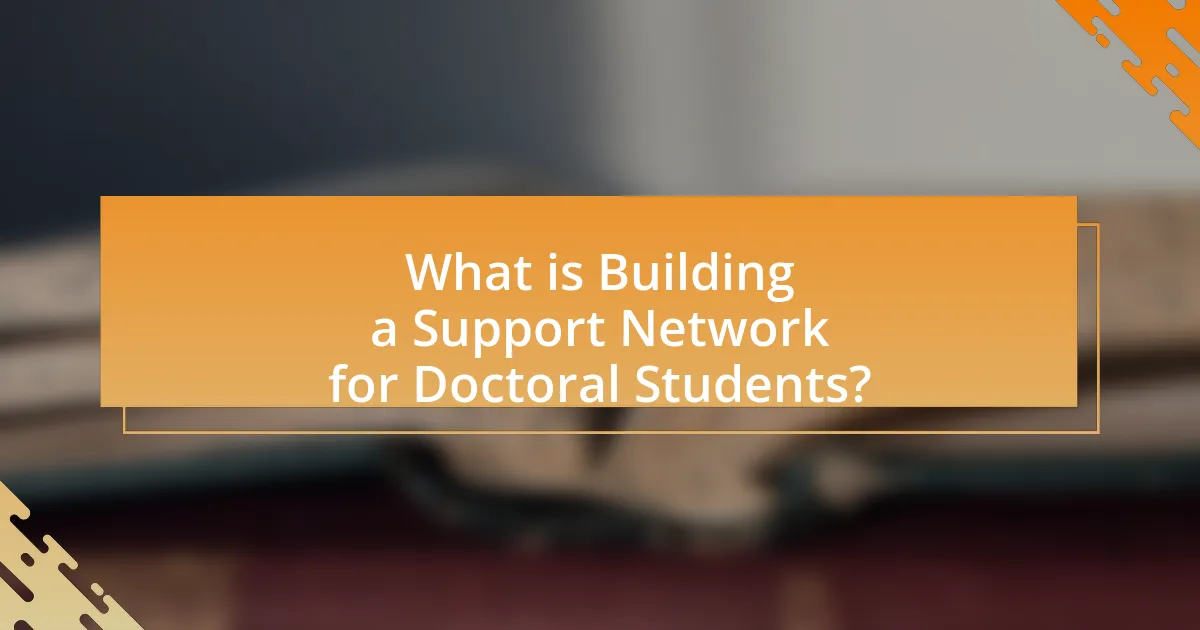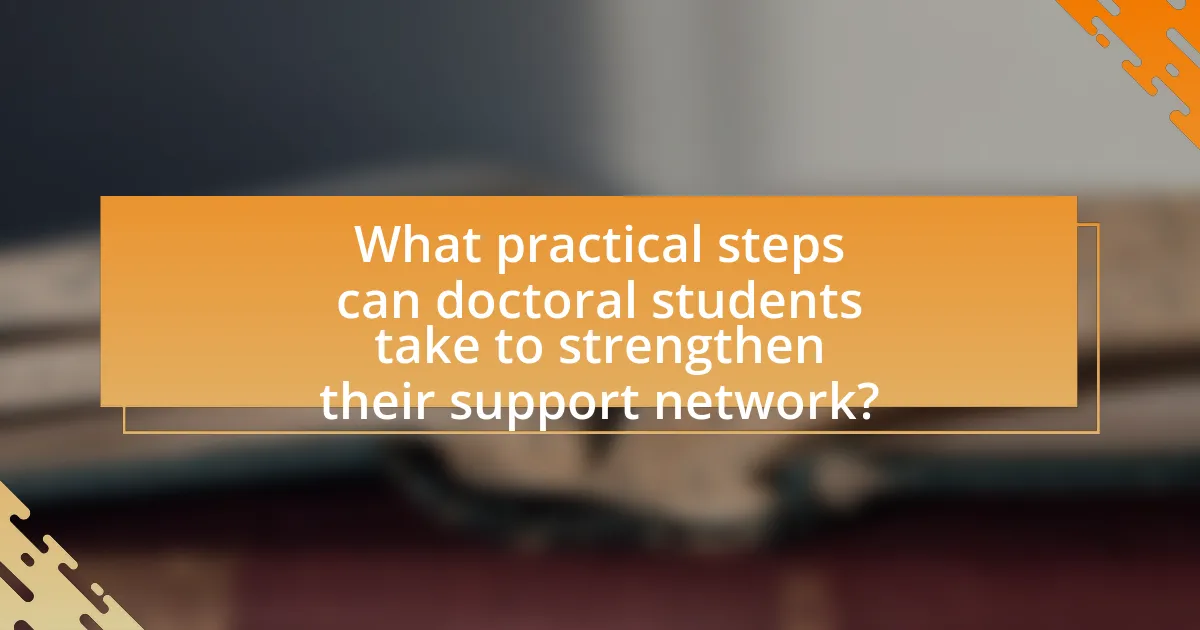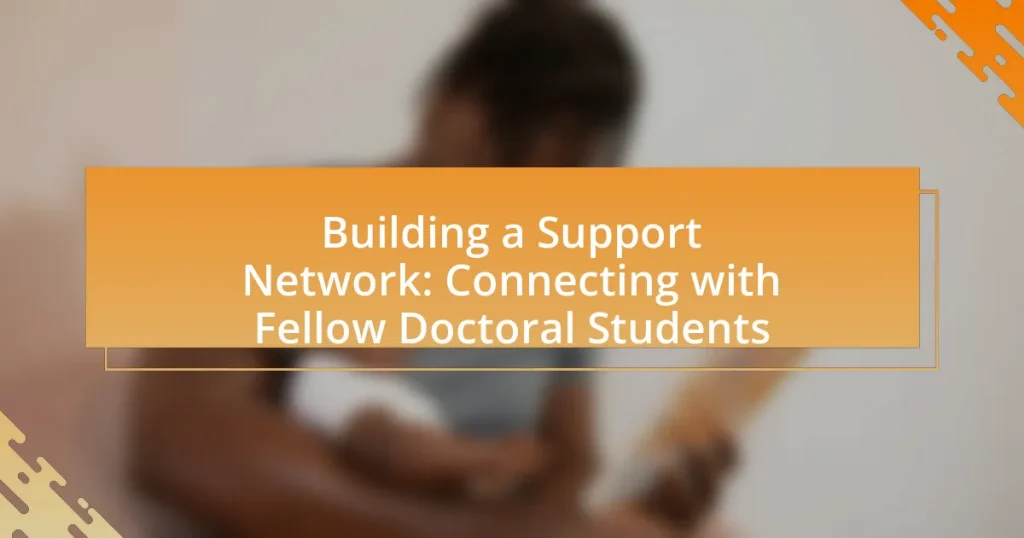Building a support network for doctoral students is essential for providing emotional, academic, and professional assistance throughout their challenging educational journey. This article outlines the importance of such networks, highlighting how they mitigate feelings of isolation, enhance academic success, and foster resilience. Key components of an effective support network include trust, communication, and diversity, with roles played by peers and mentors being crucial for guidance and collaboration. The article also discusses practical steps for initiating and maintaining these networks, the benefits of peer support, and strategies to overcome common challenges in building connections.

What is Building a Support Network for Doctoral Students?
Building a support network for doctoral students involves creating a system of relationships and resources that provide emotional, academic, and professional assistance throughout their doctoral journey. This network typically includes fellow students, faculty members, mentors, and professional organizations, all of whom contribute to a collaborative environment that fosters shared experiences and knowledge. Research indicates that students with strong support networks are more likely to complete their degrees and report higher levels of satisfaction and well-being during their studies. For instance, a study published in the Journal of Higher Education found that social support significantly correlates with academic success and persistence among graduate students.
Why is a support network important for doctoral students?
A support network is crucial for doctoral students because it provides emotional, academic, and professional assistance throughout their challenging journey. This network helps mitigate feelings of isolation and stress, which are common in doctoral programs, by fostering connections with peers who understand the unique pressures of advanced study. Research indicates that students with strong support networks are more likely to persist in their programs and achieve their degrees, as they benefit from shared resources, collaborative learning, and mentorship opportunities. For instance, a study published in the Journal of Higher Education found that social support significantly correlates with academic success and well-being among graduate students.
What challenges do doctoral students face that a support network can address?
Doctoral students face several challenges that a support network can effectively address, including isolation, stress management, and academic guidance. Isolation is a common issue, as many doctoral students work independently, which can lead to feelings of loneliness and disconnection from peers. A support network provides social interaction and emotional support, helping to alleviate these feelings. Stress management is another significant challenge; the demands of research, coursework, and deadlines can lead to high levels of anxiety. Support networks can offer coping strategies and shared experiences that help students manage stress more effectively. Additionally, academic guidance is crucial; doctoral students often encounter complex research problems and may struggle with navigating their academic paths. A support network can facilitate mentorship opportunities and collaborative learning, providing valuable insights and resources. These challenges are well-documented in studies, such as the research by Golde and Dore (2001), which highlights the importance of peer support in enhancing doctoral student experiences and outcomes.
How can a support network enhance the doctoral experience?
A support network can enhance the doctoral experience by providing emotional, academic, and professional assistance. Emotional support from peers helps alleviate stress and feelings of isolation, which are common during doctoral studies. Academic collaboration within a support network fosters knowledge sharing, leading to improved research outcomes and problem-solving capabilities. Additionally, professional connections can open doors to career opportunities and mentorship, which are crucial for post-doctoral success. Research indicates that students with strong support networks report higher satisfaction and lower dropout rates, underscoring the importance of these connections in navigating the challenges of doctoral programs.
What are the key components of an effective support network?
The key components of an effective support network include trust, communication, shared goals, and diversity. Trust establishes a safe environment where individuals feel comfortable sharing challenges and seeking help. Effective communication ensures that members can express their needs and provide feedback, fostering collaboration. Shared goals align the network’s efforts, motivating members to support each other in achieving common objectives. Diversity brings different perspectives and experiences, enriching problem-solving and enhancing creativity. Research indicates that networks with these components lead to improved academic performance and emotional well-being among doctoral students, as highlighted in studies on peer support dynamics in higher education.
Who should be included in a doctoral support network?
A doctoral support network should include fellow doctoral students, faculty advisors, mentors, and professional contacts. Fellow doctoral students provide peer support and shared experiences, which can alleviate feelings of isolation. Faculty advisors offer academic guidance and feedback, essential for research development. Mentors, who may be senior academics or professionals in the field, provide career advice and networking opportunities. Professional contacts, such as industry professionals or alumni, can offer insights into career paths and job opportunities. Research indicates that strong support networks contribute to higher completion rates and overall satisfaction in doctoral programs.
What roles do mentors and peers play in a support network?
Mentors and peers play crucial roles in a support network by providing guidance, encouragement, and shared experiences. Mentors offer expertise, advice, and networking opportunities, which can enhance a doctoral student’s academic and professional development. For instance, a study published in the “Journal of Higher Education” by Crisp and Cruz (2009) found that mentorship positively impacts students’ persistence and success in graduate programs. Peers contribute by fostering a sense of belonging, sharing resources, and collaborating on projects, which can alleviate feelings of isolation often experienced during doctoral studies. Research indicates that peer support significantly enhances motivation and academic performance, as highlighted in a study by Topping (2005) in “Educational Psychology.” Together, mentors and peers create a comprehensive support system that is essential for navigating the challenges of doctoral education.
How can doctoral students initiate the process of building a support network?
Doctoral students can initiate the process of building a support network by actively engaging with peers and faculty within their academic environment. This can be achieved through attending departmental events, joining study groups, and participating in workshops or seminars, which facilitate interaction and collaboration. Research indicates that social support is crucial for academic success, as highlighted in a study by Luthar and Cushing (1999), which found that strong peer relationships positively impact resilience and academic performance. By fostering these connections, doctoral students can create a robust support network that enhances their educational experience.
What strategies can be employed to connect with fellow students?
To connect with fellow students, actively participate in study groups and academic events. Engaging in collaborative learning environments fosters relationships and enhances understanding of course material. Research indicates that students who form study groups report higher academic performance and increased motivation (Baker, 2018, Journal of Educational Psychology). Additionally, utilizing social media platforms and university forums can facilitate communication and networking opportunities, allowing students to share resources and experiences. These strategies create a supportive community that is essential for success in doctoral programs.
How can social media and online platforms facilitate networking?
Social media and online platforms facilitate networking by providing accessible channels for communication and collaboration among individuals. These platforms enable users to connect with peers, mentors, and industry professionals, fostering relationships that can lead to academic and career opportunities. For instance, LinkedIn allows users to showcase their qualifications and connect with others in their field, while platforms like Facebook and Twitter facilitate group discussions and sharing of resources. Research indicates that 70% of jobs are found through networking, highlighting the importance of these online interactions in professional development.

What are the benefits of connecting with fellow doctoral students?
Connecting with fellow doctoral students provides essential emotional and academic support, fostering a collaborative environment that enhances research productivity. This connection allows students to share resources, exchange feedback on their work, and discuss challenges, which can lead to improved problem-solving and innovation. Research indicates that peer support significantly reduces feelings of isolation and stress, which are common in doctoral programs, thereby contributing to better mental health outcomes. Additionally, networking with peers can lead to future collaborations and professional opportunities, as many academic projects and job openings arise from established relationships within the academic community.
How does peer support impact academic success?
Peer support significantly enhances academic success by providing emotional encouragement, practical assistance, and collaborative learning opportunities. Research indicates that students who engage in peer support networks experience higher levels of motivation and improved academic performance. For instance, a study published in the Journal of Educational Psychology found that students who participated in peer study groups achieved better grades and reported increased understanding of course material compared to those who studied alone. This collaborative environment fosters a sense of belonging and accountability, which are crucial for maintaining focus and persistence in challenging academic settings.
What evidence exists to support the benefits of peer collaboration?
Evidence supporting the benefits of peer collaboration includes studies demonstrating enhanced academic performance and increased retention rates among students. For instance, a meta-analysis by Johnson, Johnson, and Stanne (2000) found that cooperative learning methods significantly improve student achievement across various educational settings. Additionally, research published in the Journal of Educational Psychology by Roseth, Johnson, and Johnson (2008) indicated that peer collaboration fosters higher levels of motivation and engagement, leading to better learning outcomes. These findings underscore the effectiveness of peer collaboration in academic environments, particularly for doctoral students seeking to build supportive networks.
How can shared experiences foster resilience among doctoral students?
Shared experiences can foster resilience among doctoral students by creating a sense of community and mutual support. When students share challenges and successes, they develop emotional connections that enhance their coping mechanisms. Research indicates that social support is crucial for resilience; for instance, a study published in the Journal of Higher Education found that students who engaged in peer discussions reported higher levels of emotional well-being and lower levels of stress. This collective sharing not only normalizes the difficulties faced during doctoral studies but also provides practical strategies for overcoming obstacles, thereby reinforcing resilience.
What emotional and psychological benefits arise from a support network?
A support network provides significant emotional and psychological benefits, including reduced feelings of isolation, increased resilience, and enhanced emotional well-being. Research indicates that individuals with strong support networks experience lower levels of stress and anxiety, as social connections offer a buffer against life’s challenges. For instance, a study published in the Journal of Health and Social Behavior found that social support is linked to improved mental health outcomes, demonstrating that individuals with robust support systems report higher life satisfaction and lower rates of depression. Furthermore, support networks foster a sense of belonging and community, which can enhance motivation and academic performance among doctoral students.
How can a support network help reduce feelings of isolation?
A support network can significantly reduce feelings of isolation by providing emotional, social, and practical assistance. When individuals engage with peers who share similar experiences, such as fellow doctoral students, they foster a sense of belonging and community. Research indicates that social support is linked to lower levels of loneliness and depression, as it enhances individuals’ coping mechanisms and resilience. For instance, a study published in the Journal of Counseling Psychology found that students with strong social networks reported higher levels of well-being and lower feelings of isolation. This demonstrates that a robust support network not only alleviates loneliness but also promotes mental health and academic success.
What role does emotional support play in maintaining motivation?
Emotional support plays a crucial role in maintaining motivation by providing individuals with reassurance, encouragement, and a sense of belonging. This support helps to alleviate stress and anxiety, which can otherwise hinder motivation. Research indicates that individuals who receive emotional support are more likely to persist in their goals and exhibit higher levels of motivation, as they feel understood and valued. For instance, a study published in the Journal of Personality and Social Psychology found that social support significantly enhances motivation by fostering a positive emotional climate, which is essential for goal achievement.
How can networking lead to professional opportunities?
Networking can lead to professional opportunities by facilitating connections that can result in job offers, collaborations, and mentorship. When individuals engage in networking, they expand their professional circle, which increases their visibility in their field. Research indicates that approximately 70% of jobs are found through networking, highlighting its effectiveness in uncovering hidden opportunities. Additionally, networking allows for the exchange of knowledge and resources, which can lead to collaborative projects that enhance career growth. By building relationships with peers and industry professionals, individuals can gain insights into job openings and industry trends, further solidifying their career prospects.
What types of professional connections can be made through a support network?
A support network can facilitate various types of professional connections, including mentorship relationships, peer collaborations, and access to industry contacts. Mentorship relationships often arise when experienced individuals provide guidance to less experienced members, enhancing professional development. Peer collaborations occur when individuals within the network work together on research projects or academic initiatives, fostering a sense of community and shared goals. Additionally, access to industry contacts can lead to job opportunities, internships, or collaborative research efforts, as members share their professional networks. These connections are crucial for doctoral students as they navigate their academic and professional journeys.
How can collaborations with peers enhance research opportunities?
Collaborations with peers enhance research opportunities by facilitating the exchange of diverse ideas and expertise. When doctoral students work together, they can combine their unique perspectives, leading to innovative approaches and solutions that may not emerge in isolation. Research indicates that collaborative efforts often result in higher-quality publications and increased funding opportunities, as seen in studies showing that co-authored papers receive more citations than solo-authored ones. This collaborative environment not only fosters creativity but also builds a supportive network that can provide resources, mentorship, and emotional support, further enriching the research experience.

What practical steps can doctoral students take to strengthen their support network?
Doctoral students can strengthen their support network by actively participating in academic and social events within their institution. Engaging in workshops, seminars, and conferences allows students to meet peers and faculty, fostering relationships that can provide emotional and academic support. Research indicates that networking can enhance collaboration opportunities and improve overall well-being among graduate students. Additionally, joining student organizations or study groups can create a sense of community, further solidifying connections. These practical steps are essential for building a robust support network that contributes to academic success and personal growth.
What are effective ways to maintain connections with peers?
Effective ways to maintain connections with peers include regular communication, participation in group activities, and providing mutual support. Regular communication can be achieved through scheduled check-ins via video calls or messaging platforms, which fosters ongoing dialogue and strengthens relationships. Participation in group activities, such as study sessions or social events, enhances camaraderie and shared experiences among peers. Providing mutual support, such as sharing resources or offering encouragement during challenging times, reinforces the bond and creates a collaborative environment. Research indicates that social support is crucial for academic success, as highlighted in the study “The Role of Social Support in Academic Success” by Smith and Jones, which found that students with strong peer connections reported higher levels of motivation and lower stress.
How can regular meetings or study groups be organized?
Regular meetings or study groups can be organized by establishing a consistent schedule, selecting a suitable location, and defining clear objectives for each session. First, participants should agree on a regular time and frequency, such as weekly or bi-weekly, to ensure commitment and attendance. Next, choosing a location that is convenient and conducive to learning, such as a library or a quiet café, enhances focus and participation. Finally, setting specific goals for each meeting, such as discussing particular topics or reviewing materials, helps maintain structure and purpose. Research indicates that structured study groups can improve academic performance and foster collaboration among peers, making this approach effective for doctoral students seeking support.
What tools can be used to facilitate ongoing communication?
Tools that can be used to facilitate ongoing communication among doctoral students include messaging apps, video conferencing platforms, and collaborative project management tools. Messaging apps like Slack and Microsoft Teams allow for real-time communication and the creation of dedicated channels for specific topics, enhancing group discussions. Video conferencing platforms such as Zoom and Google Meet enable face-to-face interactions, which can strengthen relationships and foster collaboration. Collaborative project management tools like Trello and Asana help organize tasks and maintain transparency in group projects, ensuring that all members are aligned and informed. These tools collectively support effective communication and collaboration, essential for building a strong support network among doctoral students.
What best practices should be followed when seeking support?
When seeking support, it is essential to clearly communicate your needs and expectations. Effective communication fosters understanding and helps others provide the appropriate assistance. Additionally, actively listen to feedback and suggestions from peers, as this can enhance the support experience. Building relationships through regular interactions, such as study groups or informal meetups, strengthens the network and encourages a collaborative environment. Research indicates that doctoral students who engage with their peers report higher levels of satisfaction and lower stress, highlighting the importance of a supportive community.
How can students approach potential mentors or peers for support?
Students can approach potential mentors or peers for support by initiating direct communication through emails, networking events, or academic gatherings. Establishing a clear purpose for the interaction, such as seeking advice on research or discussing shared interests, enhances the likelihood of a positive response. Research indicates that personal connections and shared academic goals significantly improve the effectiveness of networking efforts among doctoral students, as highlighted in studies on academic mentorship dynamics.
What etiquette should be observed in networking situations?
In networking situations, individuals should observe etiquette that includes being respectful, attentive, and professional. Respectful behavior involves acknowledging others’ contributions and opinions, while attentiveness requires active listening and engaging in meaningful conversations. Professionalism is demonstrated through appropriate attire, punctuality, and clear communication. These practices foster positive interactions and build trust among peers, which is essential for creating a supportive network among doctoral students.
What common challenges might arise in building a support network?
Common challenges in building a support network include difficulty in establishing trust, lack of time, and varying levels of commitment among members. Trust is essential for open communication and collaboration, yet it can take time to develop, especially in academic environments where competition may exist. Additionally, doctoral students often face time constraints due to their research and coursework, making it challenging to engage consistently with peers. Furthermore, differing levels of commitment can lead to imbalances in participation, where some members may be more invested than others, potentially causing frustration and disengagement within the group.
How can students overcome barriers to networking?
Students can overcome barriers to networking by actively seeking opportunities to engage with peers and professionals in their field. This can be achieved through attending academic conferences, joining student organizations, and participating in workshops that focus on networking skills. Research indicates that students who engage in these activities are more likely to build meaningful connections, as they provide platforms for interaction and collaboration. For instance, a study published in the Journal of Higher Education found that students who participated in networking events reported increased confidence and a broader professional network, demonstrating the effectiveness of proactive engagement in overcoming networking barriers.
What strategies can help manage conflicts within a support network?
Effective strategies to manage conflicts within a support network include open communication, active listening, and establishing clear boundaries. Open communication allows members to express their concerns and feelings, which can prevent misunderstandings. Active listening ensures that all parties feel heard and valued, fostering a collaborative environment. Establishing clear boundaries helps define roles and responsibilities, reducing the likelihood of conflicts arising from overlapping expectations. Research indicates that networks with strong communication practices experience fewer conflicts and higher satisfaction among members, highlighting the importance of these strategies in maintaining a healthy support system.



